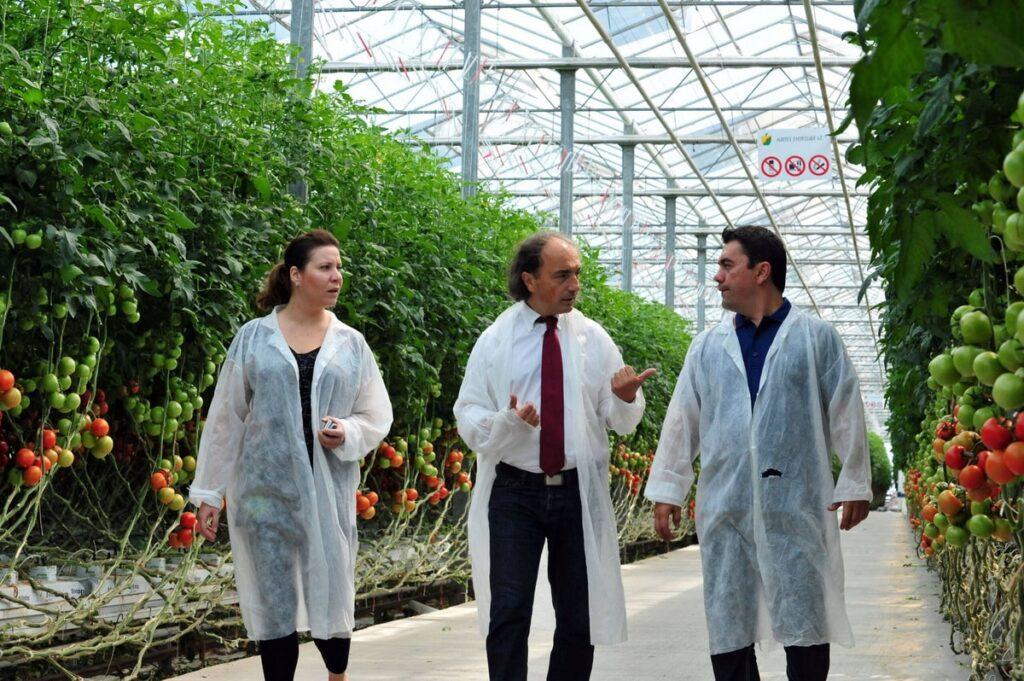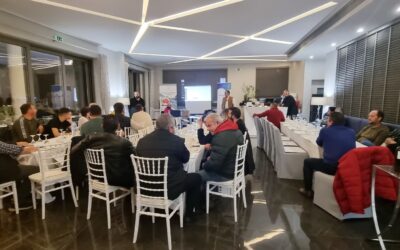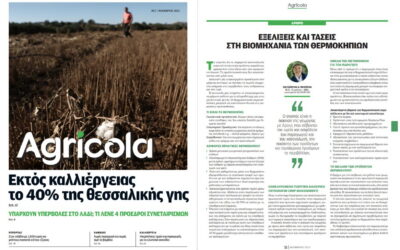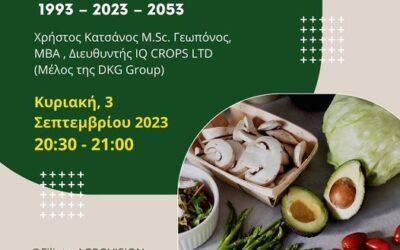
Source: https://www.grodan.com/our-thinking/grodan-blogs/preparing-growers-for-the-future/
Christos D. Katsanos and Evagelos Drimtzias are like Lego. They are made to fit. Almost thirty years ago (1993) they started their business, The DKG Group, in Greece. And Grodan helped to forge this connection. DKG Group is an international group of various companies that consult, supply, train and support different players in the greenhouse sector. But it is more than a company. The two business partners are on a joint mission: connecting growers, new and old school worldwide.
What is your story? How did you meet?
Christos Katsanos: “Evagelos and I go way back, till the early nineties.”
Evagelos Drimtzias: “We are like Lego, made to fit.”
Katsanos: “I met Evagelos when I was the Production Manager of the largest greenhouse in Greece and was experimenting with horticultural innovations. One of them was hydroponic farming; a method of growing plants without soil. The only guy in Greece who knew more about this method was called Evagelos Drimtzias. He worked for a Danish company called Grodan. Evagelos did not only talk about this new method, but actually demonstrated it to me over a period of six months. I found this very impressive at the time, he showed me every single day what hydroponic farming could do for my crops. We kept in touch and in 1993 we started our common adventure.”
Drimtzias: “Why we have a good partnership? Well, we are different personalities, but we share the same values. This is very valuable when starting and growing a solid business. For example, we both believe our company is about more than just making money. Our business of indoor farming can make a great contribution to the future of our food production. What also helps is that we are very close friends, even if we live at one and a half hour travelling from each other by plane.”
What does make your job fascinating?
Katsanos: “If Evagelos is the mind, then you can define me as the heart and soul of the DKG group. This is a fabulous combination when doing business. What is fascinating is well, is that the horticultural sector is an industry, but at the same time it’s about creating new life. And it is about collaboration. For example, I really like dealing with people from all sorts of cultural backgrounds. On the one hand we work with super dedicated, perhaps a bit more tradition-oriented growers from markets in the Middle East. But on the other hand we also work with high-tech growers from countries like Holland or Australia. We help them to expand their businesses, and we work together to produce food in a more modern, healthy and sustainable way. While we are all different, we all belong to the same food chain in the end. This idea is wonderful.”
‘We all belong to the same food chain in the end’
Drimtzias: “We also work with many different business-to-business partners. One of our partnerships we are very proud of is our collaboration with Grodan. They helped us introducing stone wool growing media solutions to growers in different countries around the world, which helps them to produce fruits and vegetables in a more sustainable and efficient way. So, by bringing these innovations to different players in the world, we all play our part in improving the food chain.”
How do you see the cultivation of fruit and vegetables in Greece in ten years’ time? What kind of changes will growers face?
Drimtzias: “In ten years’ time food production will be even more globalized, unified and competitive.”
Katsanos: “I agree. More and more major players will play a big role in the market, including growers from outside of Greece, such as Holland. That means serious competition. But there is also another change taking place: the horticultural sector will be more data driven. That means a new challenge for us: we need to build new teams and prepare them for the near future. These teams should not consist only of growers who have ‘green fingers’ and a lot of experience in the greenhouse, but also of professionals who know everything about green tech developments, like artificial intelligence and data-driven management.”
‘Build new teams and prepare them for the near future’
Drimtzias: “This means the big question is: how do we balance the valuable knowledge of the ‘old school’ growers with the next generation of data-driven growers?”
Katsanos: “We try to create this balance by hiring a lot of young talents and giving them the opportunity to work with data. But we think it’s also important that they keep working with their own hands in the greenhouse. So we always focus on two dimensions: developing and supporting the grower of today, ánd of tomorrow.”
Which three tips do you have for Greek growers?
Drimtzias: “Our number one tip to Greek growers is to have a more future-oriented business approach. We see enough beautiful and healthy companies in our regions, but they often operate individually, and some of them continue to rely on traditional methods. Secondly, growers in Greece must know how to cooperate. They have to acknowledge that their volume or resources are limited. So, they need to search for a local operational partnership. Thirdly: explore ways to work more integrated when it comes to implementing technological innovations.”
‘Growing is no one-man-show anymore’
Katsanos: “Growing is not a one-man-show. Not anymore. You have to collaborate to survive. If you are a small organization, either you have to invest to grow autonomously, ór you have to cooperate. For the first thing you need sufficient financial resources, and for the second thing, culture comes into play. And let’s not forget what’s also very important: pay attention to consumers’ needs. Do you know what veggies are grown the most these days? And what size, packaging or means of transportation is needed?”
How does a grower’s job look like in ten years’ time?
Katsanos: “Up to now, the grower’s profile in the markets we work in is mostly just one guy who works solo and produces fruits or vegetables on only one hectare. But in ten years from now, a grower will more likely be a (trading) company, a venture capitalist or a startup that invests in horticulture. It is fascinating to think about this.”
‘The new business magnet: vertical farming’
Drimtzias: “Vertical farming will likely be a new business magnet. This way of producing is getting more and more attention and gives an idea of what farming in the future could look like.”
What is the biggest lesson you learned from your partnership?
Drimtzias: “It’s all about trust. This is a mantra we always discuss with our customers and partners. If there is no trust, there is basically no partnership. Our company is a great example: the connection between Christos and me goes back more than thirty years. Because of our chemistry, we developed not only a friendship, but we also flourished in a successful business partnership.”
DKG Group is a diversified international group of companies and initiatives within the trade industry, specialized in sustainable solutions for fresh produce and agro supplies. Their business model is based on sustainability, innovation and flexibility. DKG Group was started almost thirty years ago (in 1993) by Christos D. Katsanos and Evagelos Drimtzias.
This story is part of the series Gro-Hacks, in which we ask partners and friends of Grodan about the lessons we can learn from their innovative entrepreneurial stories.
How to make your greenhouse future-proof?
Three tips for growers from Christos D. Katsanos and Evagelos Drimtzias:
- Growing is not a one-man-show anymore. You have to collaborate to survive. Set up partnerships with other businesses in the food chain, and invest in a long-term, trusting business relationship.
- Integrate technological innovations in your business by choosing the right team. Bring in traditional growers for their practical knowledge and experience, and hire young growers who know everything about the latest green tech developments, like artificial intelligence and data-driven management.
- Take a long-term approach to your business, and be open to changing your profile as a grower. In ten years from now, a grower will more likely be a (trading) company, a venture capitalist or a startup that invests in horticulture.
Search
Πρόσφατα Άρθρα
- ΦΙΛΙΑΤΡΑ 2024 – ΠΑΡΟΥΣΙΑΣΗ ΛΥΣΕΩΝ Internet of Things στα ΘΕΡΜΟΚΗΠΙΑ ΑΠ ΤΗΝ IQ CROPS
- ΜΕΓΑΛΗ ΕΚΔΗΛΩΣΗ ΤΗΣ IQ CROPS για το Internet οf Things (Iot) στην ΑΘΗΝΑ (18/1/2024)
- Season’s Greetings
- ΘΕΡΜΟΚΗΠΙΑ 2.0 – Εξελίξεις και τάσεις στη βιομηχανία των Θερμοκηπίων
- IQ Crops signs a multi-year contract extension with Grodan
- Ο κ. ΧΑΡΑΛΑΜΠΟΣ ΓΑΡΕΦΑΛΑΚΗΣ στην Ομάδα της IQ Crops Ltd
- ΑΠ ΤΟ ΑΓΡΟΤΙΚΟ ΠΡΟΙΟΝ ΣΤΟ ΤΡΟΦΙΜΟ



